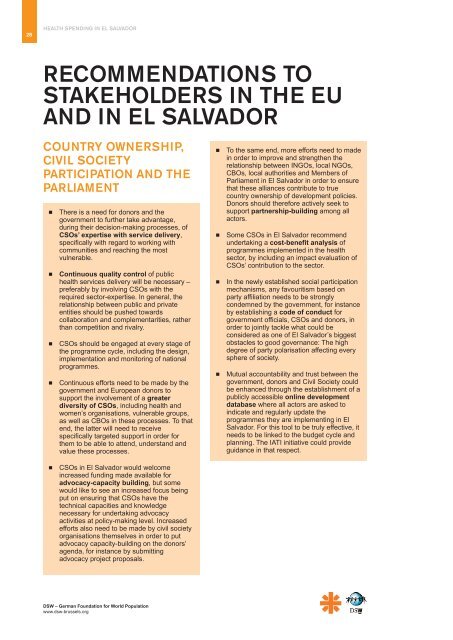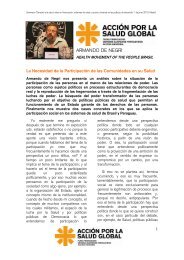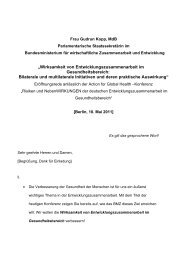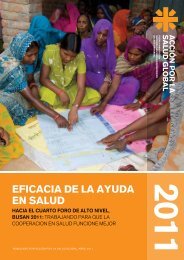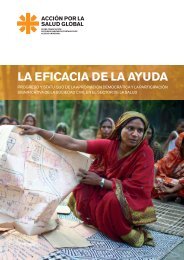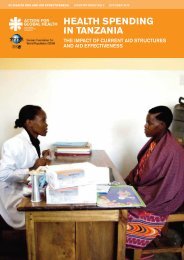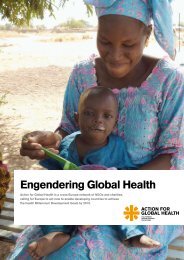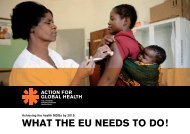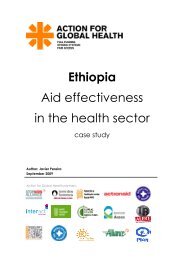HEALTH SPENDING IN EL SALVADOR - euroresources.org
HEALTH SPENDING IN EL SALVADOR - euroresources.org
HEALTH SPENDING IN EL SALVADOR - euroresources.org
Create successful ePaper yourself
Turn your PDF publications into a flip-book with our unique Google optimized e-Paper software.
28<br />
<strong>HEALTH</strong> <strong>SPEND<strong>IN</strong>G</strong> <strong>IN</strong> <strong>EL</strong> <strong>SALVADOR</strong><br />
RECOMMENDATIONS TO<br />
STAKEHOLDERS <strong>IN</strong> THE EU<br />
AND <strong>IN</strong> <strong>EL</strong> <strong>SALVADOR</strong><br />
COUNTRY OWNERSHIP,<br />
CIVIL SOCIETY<br />
PARTICIPATION AND THE<br />
PARLIAMENT<br />
■<br />
■<br />
■<br />
■<br />
There is a need for donors and the<br />
government to further take advantage,<br />
during their decision-making processes, of<br />
CSOs’ expertise with service delivery,<br />
specifically with regard to working with<br />
communities and reaching the most<br />
vulnerable.<br />
Continuous quality control of public<br />
health services delivery will be necessary –<br />
preferably by involving CSOs with the<br />
required sector-expertise. In general, the<br />
relationship between public and private<br />
entities should be pushed towards<br />
collaboration and complementarities, rather<br />
than competition and rivalry.<br />
CSOs should be engaged at every stage of<br />
the programme cycle, including the design,<br />
implementation and monitoring of national<br />
programmes.<br />
Continuous efforts need to be made by the<br />
government and European donors to<br />
support the involvement of a greater<br />
diversity of CSOs, including health and<br />
women’s <strong>org</strong>anisations, vulnerable groups,<br />
as well as CBOs in these processes. To that<br />
end, the latter will need to receive<br />
specifically targeted support in order for<br />
them to be able to attend, understand and<br />
value these processes.<br />
■<br />
■<br />
■<br />
■<br />
To the same end, more efforts need to made<br />
in order to improve and strengthen the<br />
relationship between <strong>IN</strong>GOs, local NGOs,<br />
CBOs, local authorities and Members of<br />
Parliament in El Salvador in order to ensure<br />
that these alliances contribute to true<br />
country ownership of development policies.<br />
Donors should therefore actively seek to<br />
support partnership-building among all<br />
actors.<br />
Some CSOs in El Salvador recommend<br />
undertaking a cost-benefit analysis of<br />
programmes implemented in the health<br />
sector, by including an impact evaluation of<br />
CSOs’ contribution to the sector.<br />
In the newly established social participation<br />
mechanisms, any favouritism based on<br />
party affiliation needs to be strongly<br />
condemned by the government, for instance<br />
by establishing a code of conduct for<br />
government officials, CSOs and donors, in<br />
order to jointly tackle what could be<br />
considered as one of El Salvador’s biggest<br />
obstacles to good governance: The high<br />
degree of party polarisation affecting every<br />
sphere of society.<br />
Mutual accountability and trust between the<br />
government, donors and Civil Society could<br />
be enhanced through the establishment of a<br />
publicly accessible online development<br />
database where all actors are asked to<br />
indicate and regularly update the<br />
programmes they are implementing in El<br />
Salvador. For this tool to be truly effective, it<br />
needs to be linked to the budget cycle and<br />
planning. The IATI initiative could provide<br />
guidance in that respect.<br />
■<br />
CSOs in El Salvador would welcome<br />
increased funding made available for<br />
advocacy-capacity building, but some<br />
would like to see an increased focus being<br />
put on ensuring that CSOs have the<br />
technical capacities and knowledge<br />
necessary for undertaking advocacy<br />
activities at policy-making level. Increased<br />
efforts also need to be made by civil society<br />
<strong>org</strong>anisations themselves in order to put<br />
advocacy capacity-building on the donors’<br />
agenda, for instance by submitting<br />
advocacy project proposals.<br />
DSW – German Foundation for World Population<br />
www.dsw-brussels.<strong>org</strong>


